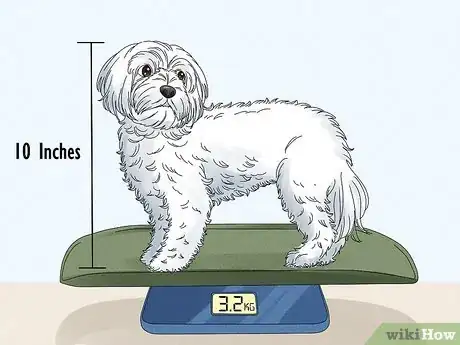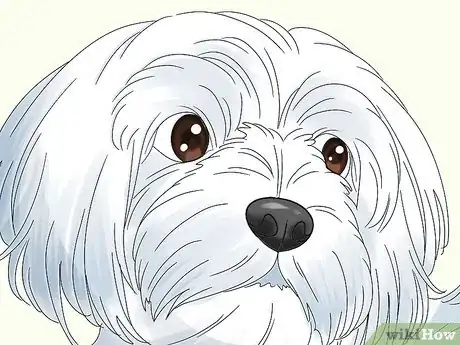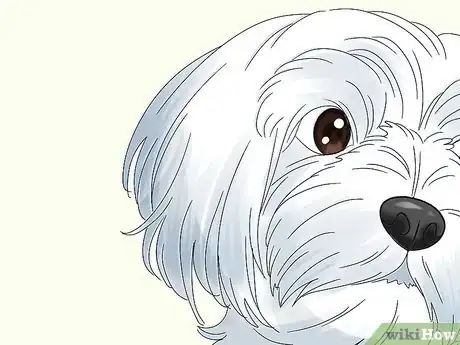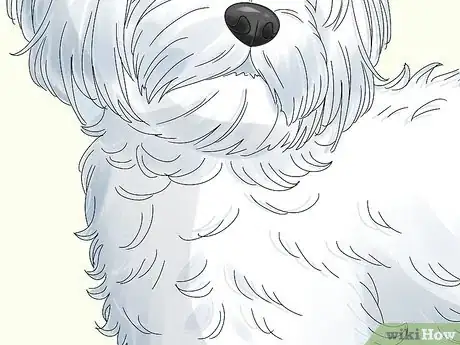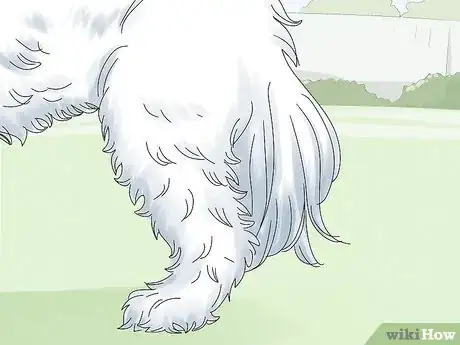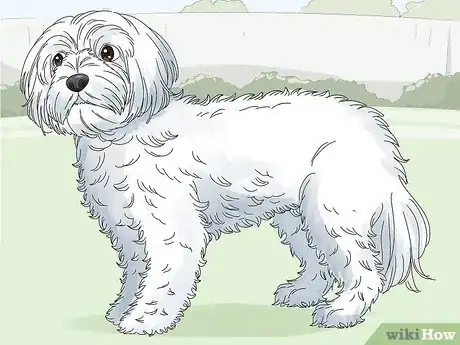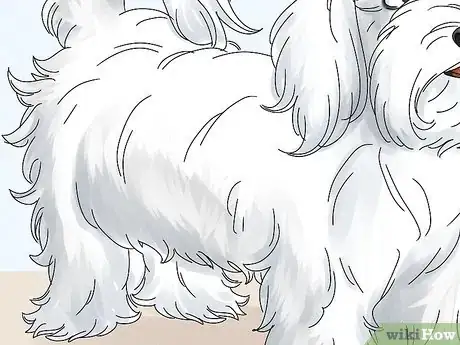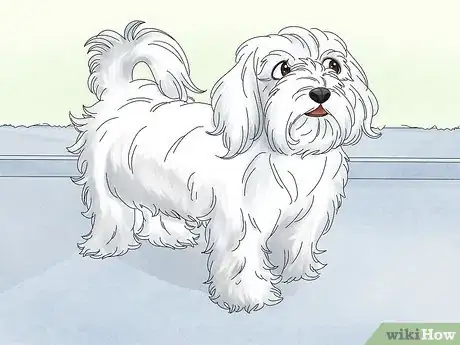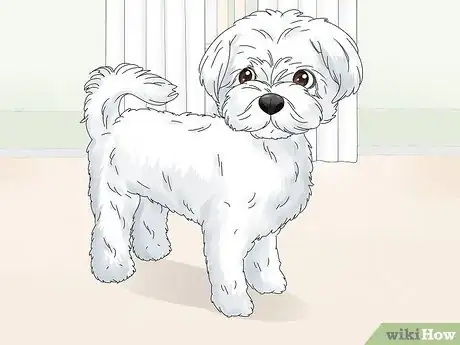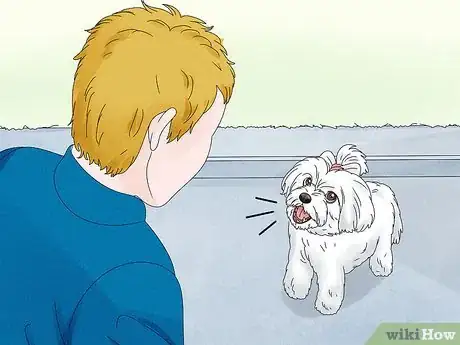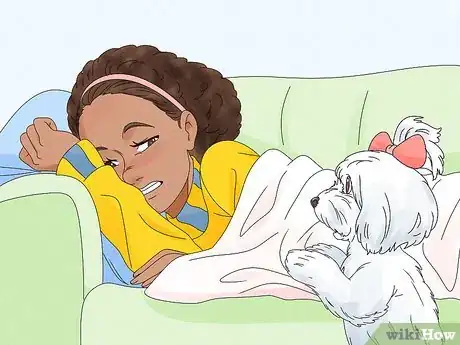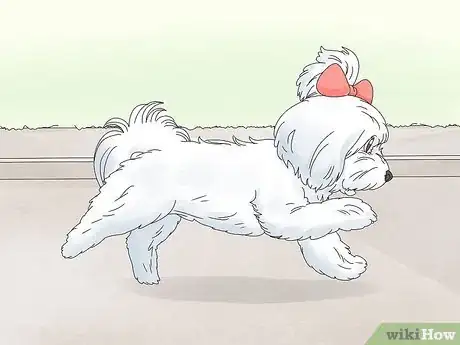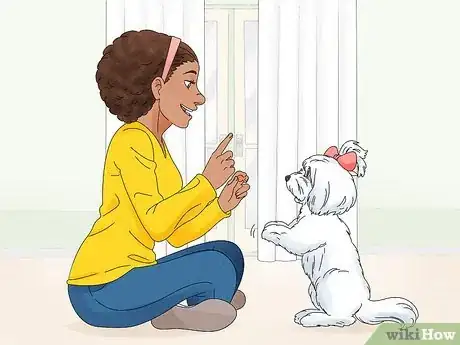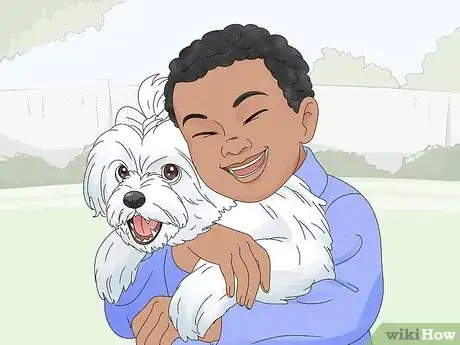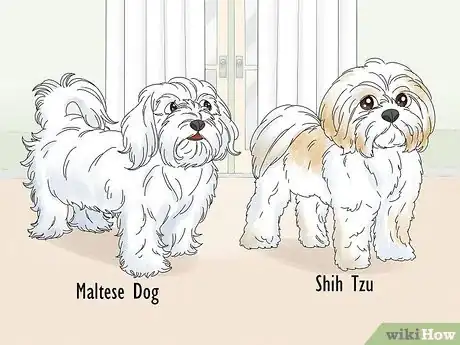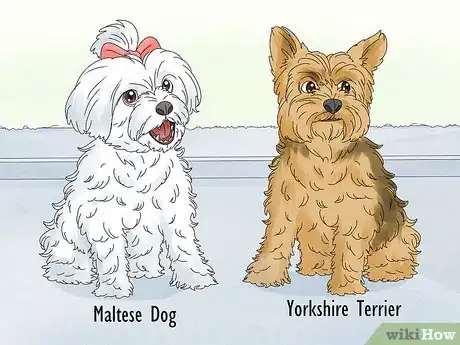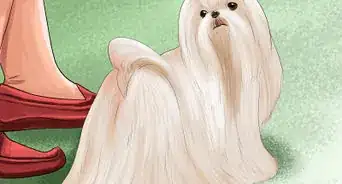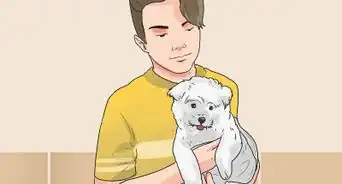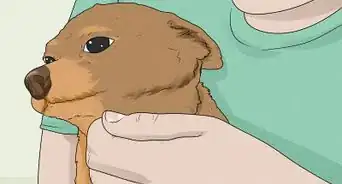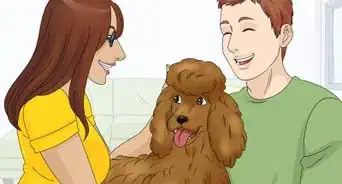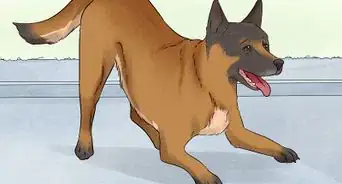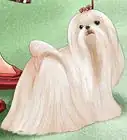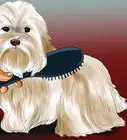wikiHow is a “wiki,” similar to Wikipedia, which means that many of our articles are co-written by multiple authors. To create this article, volunteer authors worked to edit and improve it over time.
There are 11 references cited in this article, which can be found at the bottom of the page.
This article has been viewed 28,605 times.
Learn more...
Maltese dogs are known for their long and silky, straight, white coat which covers their body and are a member of the toy group.[1] Despite their name, Maltese dogs are thought to have been brought to Malta from Phoenicia.[2] Maltese dogs can be confused with other breeds such as the Bichon Frise, but by identifying their key traits, it's easy to tell them apart. This wikiHow will help you know whether or not a dog is a Maltese.
Steps
Recognising Body Structure
-
1Check the dog's size. Maltese dogs are rather small. They are only 8–10 inches (20.3–25.4 cm) tall and weigh 4–7 pounds (1.8–3.2 kg).[3]
-
2Look at the eyes. The eyes of a Maltese dog are very dark with black rims. They aren't set too far apart, giving the dog a gentle yet alert expression.[4]Advertisement
-
3Examine the ears. Maltese dogs have drop ears that are low-set and heavily feathered with long hair that hangs down to their heads.[5]
-
4Notice the muzzle. A Maltese dog's muzzle is medium in length, fine and tapered but not snipy (not to be confused with snippy). The nose of the dog is black.[6]
-
5
-
6View the overall structure. A Maltese dog has a compact structure, with sloped shoulder-blades and elbows that are held close to the body. Their legs are fine-boned, and their hind legs are strong and moderately angulated. Their feet are small, round and tufty.[10]
Taking Notice of the Coat
-
1
-
2
-
3Look at the 'cut'. Some people choose to give their Maltese specific haircuts rather than keeping it the standard cut. Some of these cuts may include the Teddy Bear cut, Show cut, Bob cut, and Puppy cut.[15]
- The Teddy Bear cut appears as shorter fur on and around the face to the rest of the body.[16]
- The Show cut is traditionally seen as a floor length coat, with hair on the face as well. Owners sometimes put the hair on the dog's head up into a topknot.[17]
- The Bob cut seems very similar to a human bob haircut, with lengthier hair coming from the head with much shorter hair on the body.[18]
- The Puppy cut is seen as trimming to a short, consistent length.[19]
Checking Temperament
-
1Notice fearlessness. Despite their small size, Maltese don't fear a thing. They'll greet every stranger and animal as if they were their new best friend.[20]
-
2Look for affection. Maltese dogs are very affectionate and loyal, wanting their owner's attention whenever they can get it.[21]
-
3Watch for activeness. The Maltese is just as active inside as it is outside. They'll occupy themselves with other things to do when they're indoors.[22]
-
4Pay attention to intelligence. Maltese dogs are smart and quick learners, which makes training them easier.[23]
-
5See if the dog is gentle. Maltese dogs are naturally gentle and sweet-tempered. Maltese dogs are nearly never aggressive, so they are generally alright to have around children.[24]
Comparing Maltese to Similar Breeds
-
1Tell if a dog is a Maltese or a Bichon Frise. The Bichon Frise is a very similar dog to the Maltese. Both are a part of the Bichon family, which are all petite mostly white coloured breeds.[25] This means the two have a very similar appearance, but with some notable differences. The Bichon Frise is generally much larger, with their height ranging from 9–12 inches (22.9–30.5 cm) tall and weight from 12–18 pounds (5.4–8.2 kg).[26] The Bichon has curlier and denser hair, whilst the Maltese has longer straight hair, if grown out.[27]
-
2Notice how Maltese and Shih Tzu differ. Shih Tzu are another very similar breed to the Maltese. Both breeds are in the toy group and can appear quite similar on a first glance. The Shih Tzu is quite a bit bigger than the Maltese (ranging from 9–10.5 inches), but the Maltese has larger eyes.[28] Shih Tzu have a double layered coat whereas the Maltese only has one.[29] The Maltese is only white coloured but Shih Tzu can be any colour, and Shih Tzu generally bark less.[30]
-
3Spot the differences between a Maltese and a Havanese. Havanese and Maltese dogs have much in common. Both dogs descended from the Bichon family of dogs.[31] The Havanese and the Maltese both have coats that can be grown to floor length, but the Havanese's coat can be a variety of colours, opposed to the Maltese's white coat.[32] The Havanese's height ranges from 8.5–11.5 inches (21.6–29.2 cm) tall which means they can usually be bigger than most Maltese.[33]
-
4Know if a dog is a Maltese or a Yorkie. Yorkshire Terriers (Yorkies) and Maltese have some similar traits, but they have some very different traits that will help you differentiate them. Both dogs have fur that can grow long, but a Yorkie has a much darker coat.[34] Maltese are white, whereas the Yorkshire Terrier is always a darker colour. The two breeds are very similar in height and weight.[35]
Community Q&A
-
QuestionCan I breed a Yorkshire terrier/Maltese mix to a purebred Maltese?
 LinnieTop AnswererYes. This would produce a litter of "Morkie" puppies that have more Maltese traits than Yorkshire terrier traits.
LinnieTop AnswererYes. This would produce a litter of "Morkie" puppies that have more Maltese traits than Yorkshire terrier traits.
References
- ↑ https://www.akc.org/dog-breeds/maltese/
- ↑ https://www.akc.org/dog-breeds/maltese/
- ↑ http://images.akc.org/pdf/breeds/standards/Maltese.pdf
- ↑ http://images.akc.org/pdf/breeds/standards/Maltese.pdf
- ↑ http://images.akc.org/pdf/breeds/standards/Maltese.pdf
- ↑ http://images.akc.org/pdf/breeds/standards/Maltese.pdf
- ↑ http://images.akc.org/pdf/breeds/standards/Maltese.pdf
- ↑ http://images.akc.org/pdf/breeds/standards/Maltese.pdf
- ↑ https://www.petmaltese.com/maltese-dog-appearance#:~:text=The%20Maltese%20has%20a%20naturally,side%20of%20the%20hind%20quarter.
- ↑ http://images.akc.org/pdf/breeds/standards/Maltese.pdf
- ↑ https://www.akc.org/dog-breeds/maltese/
- ↑ http://images.akc.org/pdf/breeds/standards/Maltese.pdf
- ↑ http://images.akc.org/pdf/breeds/standards/Maltese.pdf
- ↑ http://ankc.org.au/media/pdf/635576245197502650_04ad17f8-dca4-4067-b29c-5531ed264cfe.pdf
- ↑ https://www.rover.com/blog/maltese-haircut-styles/
- ↑ https://www.rover.com/blog/maltese-haircut-styles/
- ↑ https://www.akc.org/expert-advice/lifestyle/maltese-two-different-looks/
- ↑ https://www.rover.com/blog/maltese-haircut-styles/
- ↑ https://www.akc.org/expert-advice/lifestyle/maltese-two-different-looks/
- ↑ https://www.dogtemperament.com/maltese-temperament/
- ↑ https://www.dogtemperament.com/maltese-temperament/
- ↑ https://www.dogtemperament.com/maltese-temperament/
- ↑ https://www.dogtemperament.com/maltese-temperament/
- ↑ https://www.dogtemperament.com/maltese-temperament/
- ↑ https://dogsnet.com/maltese-vs-bichon/
- ↑ https://dogsnet.com/maltese-vs-bichon/
- ↑ https://dogsnet.com/maltese-vs-bichon/
- ↑ https://dogsnet.com/maltese-vs-shih-tzu/
- ↑ https://dogsnet.com/maltese-vs-shih-tzu/
- ↑ https://dogsnet.com/maltese-vs-shih-tzu/
- ↑ https://dogsnet.com/havanese-vs-maltese/
- ↑ https://dogsnet.com/havanese-vs-maltese/
- ↑ https://dogsnet.com/havanese-vs-maltese/
- ↑ https://dogsnet.com/maltese-vs-yorkie/
- ↑ https://dogsnet.com/maltese-vs-yorkie/
